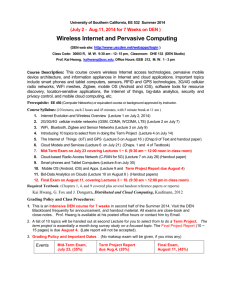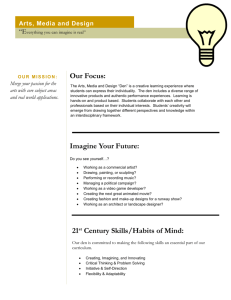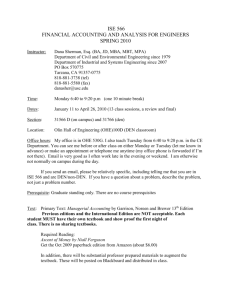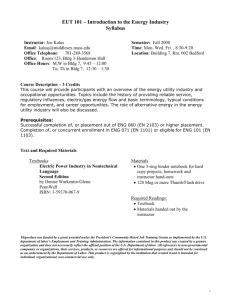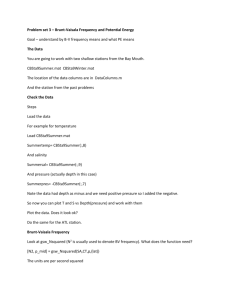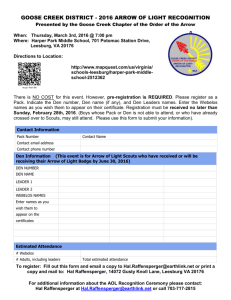ISE 566 FINANCIAL ACCOUNTING AND ANALYSIS FOR
advertisement
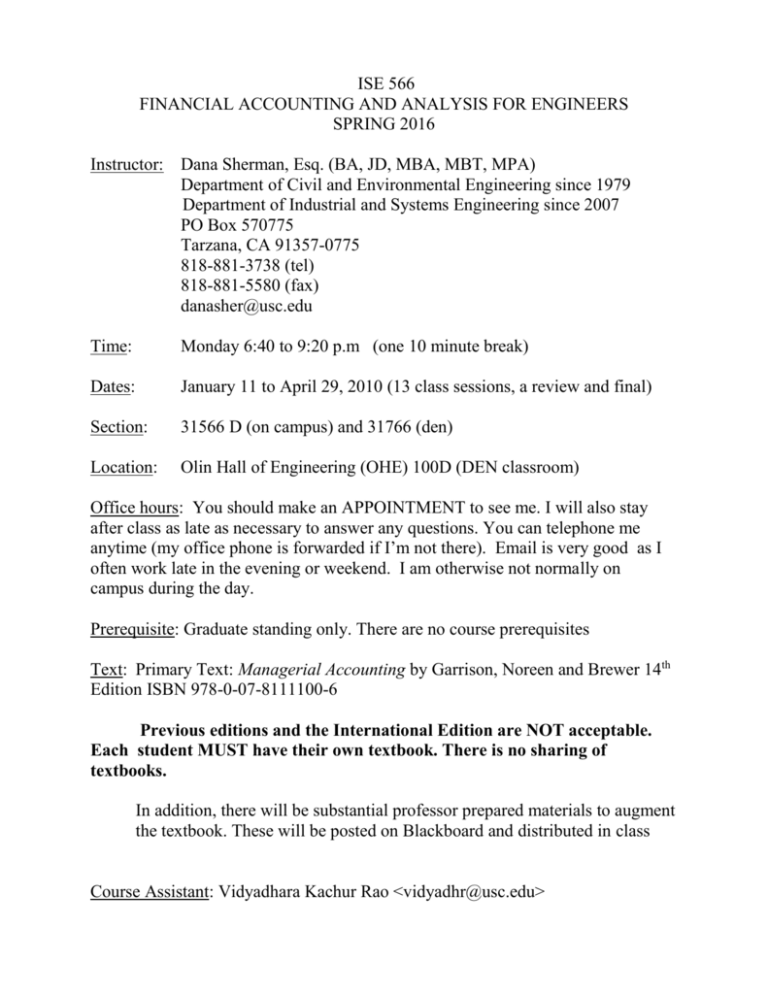
ISE 566 FINANCIAL ACCOUNTING AND ANALYSIS FOR ENGINEERS SPRING 2016 Instructor: Dana Sherman, Esq. (BA, JD, MBA, MBT, MPA) Department of Civil and Environmental Engineering since 1979 Department of Industrial and Systems Engineering since 2007 PO Box 570775 Tarzana, CA 91357-0775 818-881-3738 (tel) 818-881-5580 (fax) danasher@usc.edu Time: Monday 6:40 to 9:20 p.m (one 10 minute break) Dates: January 11 to April 29, 2010 (13 class sessions, a review and final) Section: 31566 D (on campus) and 31766 (den) Location: Olin Hall of Engineering (OHE) 100D (DEN classroom) Office hours: You should make an APPOINTMENT to see me. I will also stay after class as late as necessary to answer any questions. You can telephone me anytime (my office phone is forwarded if I’m not there). Email is very good as I often work late in the evening or weekend. I am otherwise not normally on campus during the day. Prerequisite: Graduate standing only. There are no course prerequisites Text: Primary Text: Managerial Accounting by Garrison, Noreen and Brewer 14th Edition ISBN 978-0-07-8111100-6 Previous editions and the International Edition are NOT acceptable. Each student MUST have their own textbook. There is no sharing of textbooks. In addition, there will be substantial professor prepared materials to augment the textbook. These will be posted on Blackboard and distributed in class Course Assistant: Vidyadhara Kachur Rao <vidyadhr@usc.edu> If you have ANY questions or problems with regard to quiz postings or homework postings or reading postings or grading or Blackboard access or course administration, you should ask the teaching assistant first as the TA is much more likely to be able to help you than the professor will be. Course Objectives: The course is intended to provide students in engineering and related disciplines with the information and skills necessary to engage in financial decision- making at both an operational level and a business enterprise level. Topics to be covered include concepts from cost accounting, managerial accounting, law and finance. The specific course objectives include enabling the student to: Identify, formulate and solve financial issues in engineering Be able to understand financial reports and reporting systems Understand the legal context in which financial decisions are made Understand process cost determination and allocations Have knowledge of contemporary business issues Participate effectively on multi-disciplinary teams Understand professional ethical issues and responsibilities Course Expectations: This is a VERY demanding course. There will be about 50 pages of reading, a homework assignment and a quiz almost every class session. Plus you will watch various videos. You should be prepared to devote the time necessary to take the course. The course material is cumulative and if you consistently fail to turn in homework on time, not only will you fall behind, but your point total (and hence your grade) will also suffer. Method of Instruction: Lecture, class discussion and review of assignments conducted by the instructor will occupy the class period. If you are not a DEN student, you are expected to attend each class session throughout the period. The class is intended to be practical in its approach. Students who are employed are STRONGLY encouraged to bring to the attention of the instructor procedures, problems or issues that the students deal with on a daily basis. There is no separate problem session or discussion section. In addition, the teaching assistant will be responsible for the administrative aspects of the course such as tabulating grades and insuring DEN access if applicable. The discussion board will also be activated but will not be moderated by the instructor. Grading: Midterms Quizzes Assignments Final Total 30% (15% each) 10% 10% 50 % (cumulative) 100% NOTE: When you check your scores on the Blackboard, these will be UNWEIGHTED points. The points will be weighted at the end of the course. It will give you general information regarding how you did relative to the other students on each quiz/assignment, but not necessarily reflect your overall class standing. Final course grades are heavily weighted to the final exam. DEN students and the in-class students will be given exactly the same quizzes, assignments and exams. However, grades for the two groups will be assigned independently. There is no “forced curve” and grades are based upon your personal comprehension of the material and your performance on the exams and assignments relative to the other students. Although there is no forced curve, the quality of your fellow classmates as students is expected to be quite high and the learning expectations of the instructor are established accordingly. Sometimes there are extra credit opportunities if appropriate. If an extra credit opportunity is given, it is really extra credit and points are added after the final course points have been allocated. Sometimes these extra credit activities are based upon campus or campus related events that the DEN students cannot attend. This is OK. You are not expected to come from Korea to attend a campus event and there is no penalty for not going. Cooperative learning is encouraged on homework assignments. Thus, it is to your benefit to help each other as much as possible. Scores will be posted on DEN and will be sent on a frequent basis by the course assistant. You are also encouraged to contact the instructor at any time if you are having problems completing the assignments or understanding the material. While cooperative learning is encouraged, plagiarism or the copying of the work of another student is not allowed. If this is determined to occur, the grade for a particular assignment will be negative the number of possible points for that assignment. Assignments: There will be a homework assignment due most class sessions. Homework assignments are due at the beginning of each class. If you expect to miss class, you can fax or email your assignment prior to the class. Late assignments are accepted up to one week late with a penalty of 50% of the actual score only if the answers have not been discussed in class. Put your name on your homework assignment papers and your student number. Please use the name that you are registered under. You should turn in the original assignment but retain a copy for yourself to have in class for discussion. If you have a question regarding the grading of homework, you should bring it to the attention of the instructor as soon as possible. If you have a problem with the grading (such as you turned in a paper and the score is not posted within 2 weeks), please inform the instructor or TA immediately or the ability to investigate the problem may be lost. Unclaimed papers will be discarded after four weeks. DEN students are expected to have submitted their homework prior to commencement of class and should keep a record of transmittal. Extra Credit: From time to time there may be special events or other opportunities for extra credit. This really is EXTRA credit and can add up to 5% to your total score I will tell you what these are as they arise. Logistically, the DEN students may not be able to participate, but you will NOT be put at a disadvantage in any manner. Quizzes and Examinations: There will be a quiz almost every class at the start of class. DEN students are expected to complete the quiz on-line before 6:45 p.m. and an effort will be made to post the quizzes in advance. There is normally no make-up of a missed quiz. However, if a resident student expects to be away from class for a valid reason (e.g. employment travel) then special arrangements can be made to allow the quiz to be taken on-line. The quiz each week will be based primarily upon two subjects: the lecture from the previous week and the reading assignment for that week. Thus, you are expected to have read the weekly assignment prior to the start of class. Examinations are not cooperative. The quizzes and the midterm examinations are open book and open note, but you should not rely too heavily on this as time is limited. You may not share books or notes during an exam. Calculators may be used if appropriate. Laptop computers may be used but only for notes and internet access is NOT allowed and NO electronic dictionaries. The final examination will be cumulative and will be closed book. DEN students in proximity to the campus should be personally present for the final exam. Remote DEN students will proceed to a proctored location for the final exam only. DEN students do NOT need to be proctored for the midterms or for the quizzes. The format of the examinations will all be true-or-false or multiple choice or matching. While this may be criticized for not allowing partial credit, I have found that there is an extremely high correlation between students who do well on essay type exams and those that do well on objective tests. The very large number of questions that will be given during the semester also reduces to near zero the chance that guessing will have a significant impact on the final total points. Communication: I expect to communicate with you often during the semester. This will be done primarily through the official email address that you have with USC, mostly using the Announcements feature of Blackboard, and NOT through some other email address. You are expected to check this frequently. Please do not ignore this and I do not want to receive “mailbox full” notices. Return of Assignments: For dozens of years, faculty returned students’ homework in class. Some people believe that to do this in a manner where a student can see another students’ paper/score is a violation of federal educational privacy laws. IF YOU ARE CONCERNED ABOUT THIS, PLEASE ADVISE ME IN CONFIDENCE AND YOUR PAPERS WILL BE RETURNED IN A SEALED ENVELOPE. OTHERWISE, YOU WILL BE DEEMED TO HAVE WAIVED YOUR RIGHT OF PRIVACY AND TRADITIONAL/FASTER DISTRIBUTION METHODS WILL BE USED. Instructional Philosophy: I would like to make two important points with regard to the course. First, the goal of the course is not about your grade. My goal in the course is to make it possible for you to learn at least as much of the subject matter as I present and as much as you want to. There is only one purpose of the quizzes and assignments and midterms that is to help you learn the material and then evaluate your understanding so you can improve. If you need help with the homework, discuss it with another student or the teaching assistant. If you don’t understand the material, don’t worry and wander around the intellectual darkness...ask the instructor. Learning is not about competing with others, it is about doing the best you can. Second, grading is inherently unfair. It does not measure effort. It does not measure worthiness, need or desire. It does not measure the amount of your improvement. It only measures either (a) final performance relative to a fixed standard or (b) final performance relative to others in the class. The grade is not the goal; the grade is only an outcome. Most of you will not understand this, but the grade is not important. You are IN graduate school. Your present or future employer is not going to ask you what your grade was in ISE 566. Instead, you will be asked to determine the cost of a product, for instance. It is not your grade that will determine if you can do this, it is your knowledge of the subject. But I assure you, if you get a good grade, it will reflect your knowledge of the material. DEN: DEN students and on-campus students have access to course webcasts at the DEN website. DEN students may watch webcasts of the lectures as they occur or subsequently, or both. On campus students will automatically have access to DEN. On campus students may review lectures only after they occur. For general technical problems with the course website, contact DEN Web Support at 213-8211321 or email at webclass@den.usc.edu. For general administrative questions relating to DEN call 213-740-4488 or email denadmin@usc.edu. The discussion board feature of DEN will be established so students can ask each other for help. For the DEN students, many of you are in the Los Angeles area and some of you are not more than an hour from campus, even in traffic. MANY of the DEN students in class have attended the class sessions personally whenever possible and have relied upon DEN only if necessary. Almost uniformly, the DEN students have told me that they prefer attending in person rather than watching the video. I will have the Webex enabled only if requested. I am happy to do so but I have arranged it in the past with only limited participation. Miscellaneous: Taping of class presentations or discussions is not allowed. This is what DEN is for. There is no term project or paper due either as a requirement or as “extra credit.” Personal Conflicts Occasionally, a student will have a personal, family, medical or other emergency, will have the necessity to travel for work related business, or will be compelled to miss a class due to a significant university sponsored event in which the student will participate. Contact the instructor as soon as the conflict is known and arrangements will be made to the extent possible to allow the student to timely turn in homework assignments. Additional Important Information: (The “legal” stuff...what else would you expect) Academic Integrity The Viterbi School adheres to the University’s policies and procedures governing academic integrity as described in Scampus. Students are expected to be aware of and to observe the academic integrity standards applicable to all students and will be enforced in this course. Disability Services Any student requesting academic accommodations based upon a disability is required to register with the Disability Services and Programs Office (DSPO) each semester. A letter of verification for approved accommodations can be obtained from DSPO and should be promptly delivered to the instructor. DSPO is located in STU 301 and the telephone is 213-740-0776. Religious Observances On occasion a class session may conflict with a special day of religious observance. If you advise me in advance, reasonable accommodation will be made. COURSE CALENDAR (Subject to Adjustment) I. ORGANIZATION OF THE ENGINEERING ENTERPRISE Jan 11 Course Introduction: American legal system Reading Handout Materials Ascent Introduction Jan 18 HOLIDAY (Martin Luther King Day-no class) Jan 25 Business Forms: Corporations, partnerships, LLC’s, joint ventures, equity investments, reorganizations Quiz Homework on Legal System Due Mind Over Money Video Reading Handout Materials Feb 01 Securities and Debt Transactions: common and preferred stocks, secured and unsecured lending in real and personal property; bonds; recourse and non-recourse financing; personal guarantees Quiz Business Forms Homework Due Reading Handout Materials II. FINANCIAL ACCOUNTING FOR ENGINEERING MANAGEMENT Feb 08 Introduction to Financial Accounting Concepts: cash and accrual accounting, historic basis, depreciation, etc. Securities and Debt Homework Due Reading Handout Materials GNB Chapter 1 Feb 15 PRESIDENTS’ DAY (Holiday-No Class) Feb 23 Mid-Term 1: Also, the Balance Sheet: short term and long term assets and liabilities, retained earnings, tangible and intangible assets, goodwill Financial Accounting Homework Due Handout Materials. Mar 02 The Income Statement and Cash Flow Statement: cash and accrual income, depreciation effects, amortization concepts Quiz Balance Sheet Homework Due Reading Handout Materials/ GNB Chapter 14 Mar 09 Financial Statement Analysis: present worth analysis, rate of return, financial ratios Quiz Income Statement Homework Due Reading GNB Chapter 15 Mar 14 SPRING RECESS- (no class) Mar 21 Midterm 2: (Financial Accounting) Introduction to Business Ethics Money, Power and Wall Street video Financial Statement Analysis Homework Due Reading Handout Materials III. ACCOUNTING FOR ENGINEERING OPERATIONS MANAGEMENT Mar 28 Operational Costs: Material and labor costs, fixed and variable, direct and indirect costs, opportunity costs, make or buy decisions Quiz View Blackmoney- HMW Due GNB Chapters 2 and 12 Apr 04 Systems Design: Job order costing; cost measurement, costs of goods sold and manufactured, overhead rates; process costing; flow of materials, labor and overhead costing Quiz Homework Due Chapters 2 and 13 GNB Reading Chapters 3 and 4 Apr 11 Cost Behavior and Cost Volume Profit Relationships fixed and variable costs, equation and contribution models Quiz Homework Due Chapters 3 and 4 GNB Reading Chapters 5 and 6 View Meltdown Apr 18 Variable Costing and Activity Based Costing overhead allocation, activity rates, budgeting and cash flow: Quiz Homework Due Chapters 5 and 6 Reading GNB Chapters 7 and 8 Apr 25 Profit Planning and Budgeting Quiz Homework Due Chapters 7 and 8 Reading GNB Chapters 9 and 10 Apr 29 Review Day (Tentative); Homework Chapt 9 and 10 due May 09 Final Exam (7:00 to 9:00 pm)
